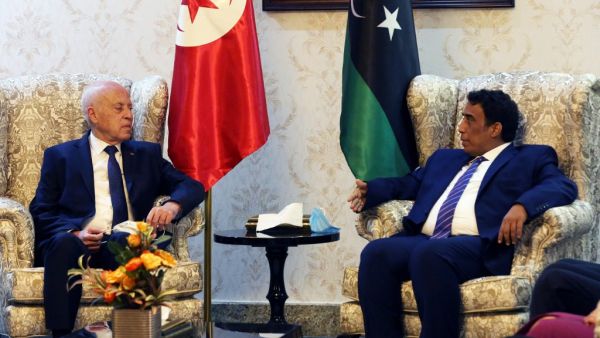Tunisia’s president met Wednesday with Libya’s newly-appointed government in Tripoli, becoming the first head of state to visit the war-torn country a day after the interim administration took power.
President Kais Saied landed in the capital’s Mitiga International Airport and was received by Mohammad Younes Menfi, head of Libya’s Presidency Council. They then headed for talks and the Tunisian leader also met Prime Minister Abdul Hamid Dbeibah, leader of the new Government of National Unity (GNU).
The issue of repatriation is so intriguing and harrowing. I’ve been reading about this since watching the documentary 'The Return: Life After ISIS'. From my POV, this seems to be the best answer from the involved governments. https://t.co/TvlT24wpT9
— Alessandra (@alessandra_kr) March 18, 2021
“We will work together to restore normal relations at all levels,” Menfi said at a brief news conference with Saied.
Saied’s office said the talks focused on the economy and trade between the two nations, along with Tunisia’s support for a democratic path in Libya. “It’s time to overcome all causes of estrangement,” Saied said, without elaborating.
The Tunisian presidency said in statement issued after the meetings that the two countries have agreed on reactivating high level committees, chambers of commerce and bilateral agreements.
They further stressed their “determination to facilitate the movement of people and merchandise across borders”.
“They also emphasized the need to reactivate the Arab Maghreb Union (AMU) at the level of foreign ministers and heads of state so as to serve the interests of Maghrebi peoples”.
The AMU also numbers Algeria, Mauritania and Morocco but has been dormant for many years.
Tunisia had been a major economic partner with Libya before uprisings engulfed the two countries 10 years ago. Trade between them has declined to less than $363 million from more than $1.2 billion in 2010, according Tunisia’s state-run news agency.
Saied said he also discussed the case of two Tunisian journalists — Sofiene Chourabi and Nadhir Guetari — who disappeared in eastern Libya in 2014. He did not provide details.
The Islamic State (ISIS) group, which had been active in eastern Libya at the time, had said the two journalists were killed. But Tunisian officials refuted the claim.
The visit by Saied, the first for a Tunisian leader since 2012, came a day after Libya’s government took power in Tripoli, officially beginning a relatively brief tenure designed to end with democratic elections late this year in the oil-rich country.
Through the visit, Saied is said to be sending messages to audiences at home and abroad.
To those at home he is taking ownership of the foreign policy agenda setting prerogatives starting with Libya.
The Islamists, represented by Ennahda leader and Speaker of Parliament Rached Ghannouchi, have manoeuvered in recent months to gear Tunisia’s diplomacy in a direction that is favourable to the GNU’s predecessor, the Government of National Accord. In a post published Wednesday on Facebook, former Tunisian Foreign Minister Rafik Abdessalem accused Saied of having alienated the GNA by not offering it support when it faced an offensive by the troops of Field Marshal Khalifa Haftar.
Saied is also seen to be in a race against time to beat Tunisia’s regional competitors for Libyan market opportunities especially in matters of trade and employment.
Menfi, Saied agree on boosting trade, investment between #Libya and #Tunisia https://t.co/Ec0LDt5pIy
— The Libya Observer (@Lyobserver) March 17, 2021
In November, Tunisia hosted talks of the UN-picked Libyan political forum, which eventually produced a roadmap that appointed the interim government to lead Libya through presidential and parliamentary elections on Dec. 24.
The repatriation of the families of Tunisian militants is also among the issues of common concern of the two countries’ leaders.
Tunisia has taken back at least 16 women and ten children detained for links with extremist jihadist fighters in war-ravaged neighbouring Libya, rights groups said Wednesday. Earlier this month, they were handed over in two separate groups by Libyan authorities at the Tunisian border said Mustapha Abdelkebir, from the Tunisian Observatory for Human Rights.
This article has been adapted from its original source








